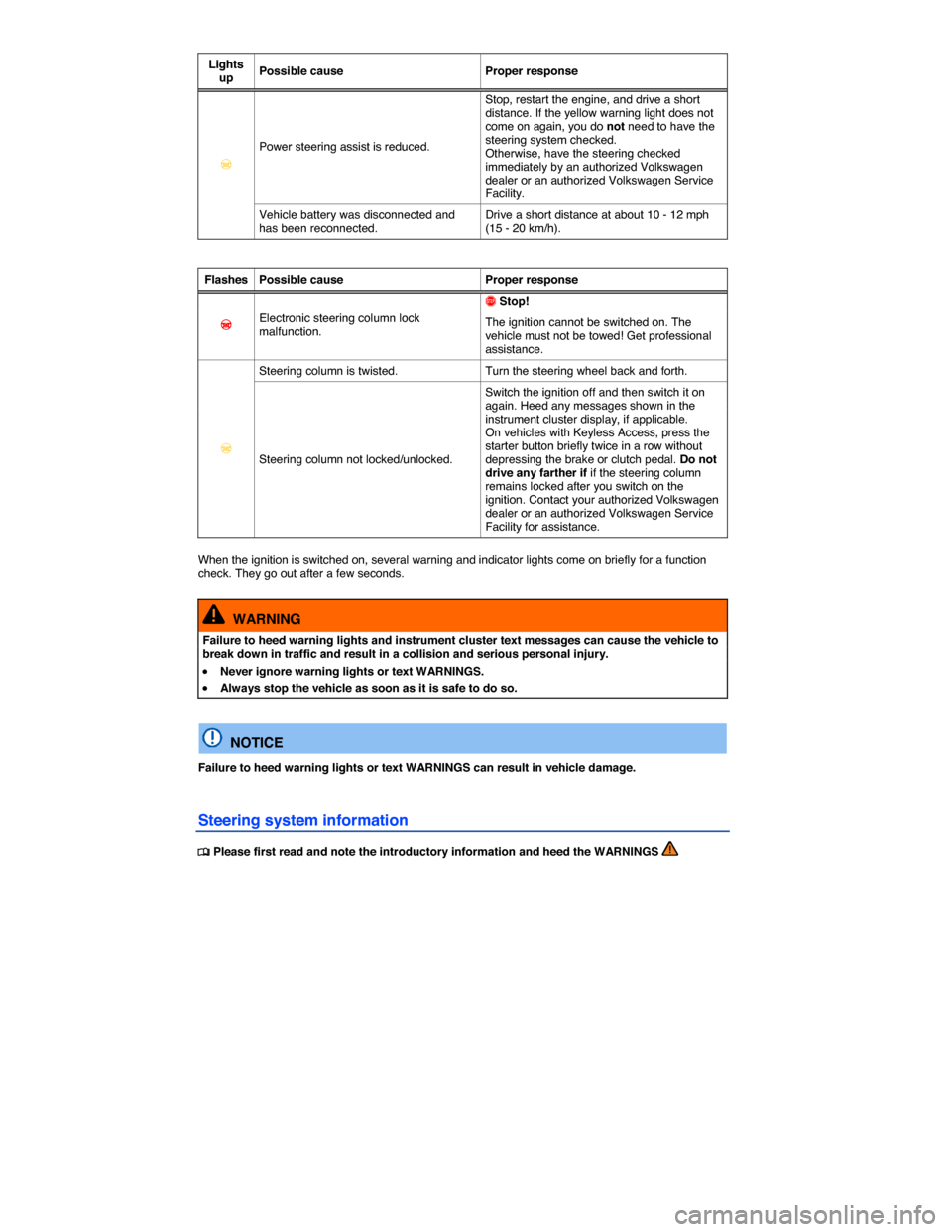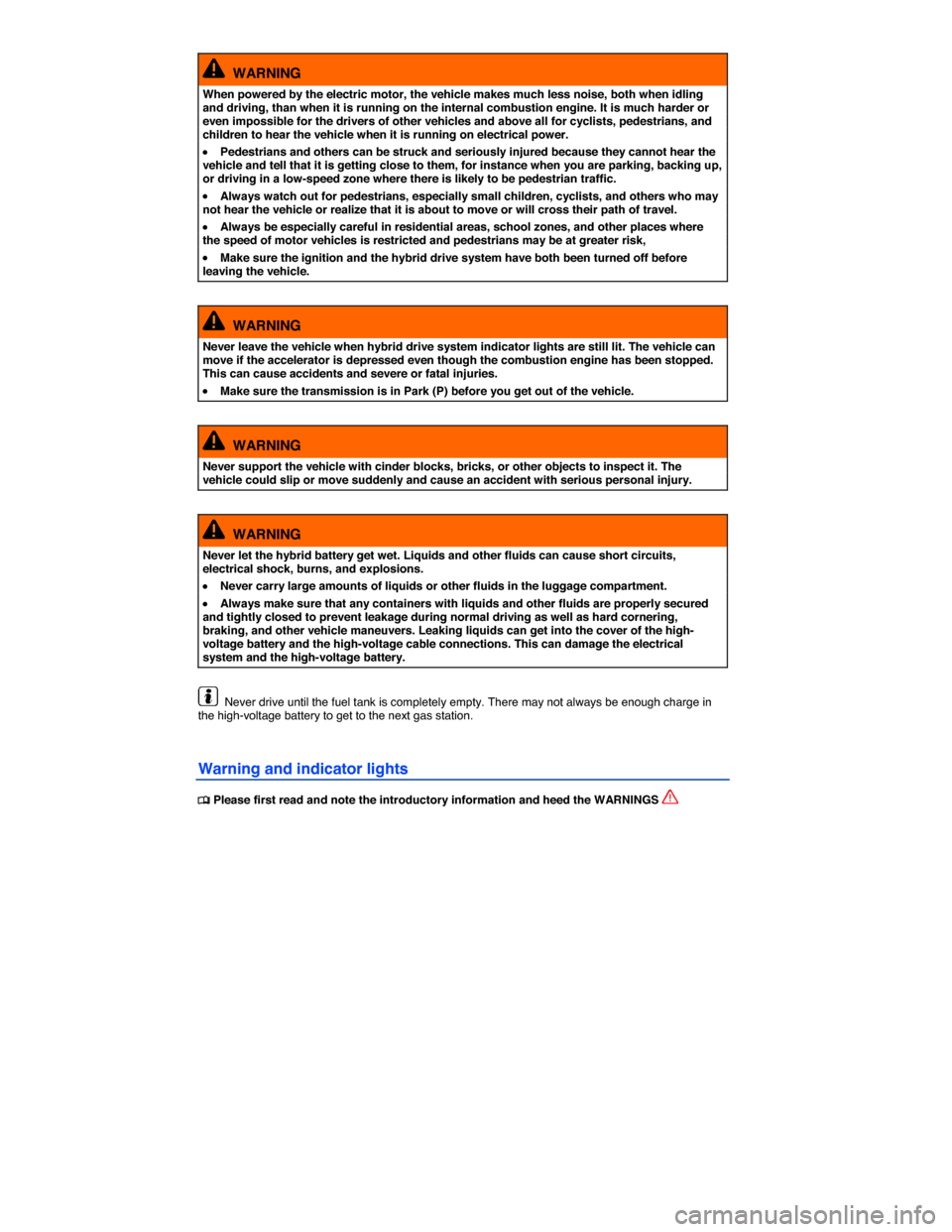2014 VOLKSWAGEN TOUAREG engine
[x] Cancel search: enginePage 396 of 620

performance, increases stopping distances and can even cause total brake failure. Your safety and
the safety of others depends on brakes that are working properly at all times ⇒ .
Brake fluid specifications
Volkswagen has developed a special brake fluid that is optimized for the brake system in your Volkswagen. Volkswagen recommends that you expressly use brake fluid that conforms to quality standard VW Standard 501 14 for optimum performance of the brake system. Check the information on the container for the brake fluid you want to use to make sure it meets the requirements for your vehicle.
Brake fluid that complies with VW Standard 501 14 can be purchased from your authorized Volkswagen dealer or authorized Volkswagen Service Facility.
If this special brake fluid is not available you may – under these circumstances – use another high-quality brake fluid that complies with U.S. Federal Motor Vehicle Safety Standard (FMVSS) 116 DOT 4
⇒ .
Please note, however, that not all brake fluids that comply with U.S. Federal Motor Vehicle Safety Standard FMVSS 116 DOT 4 have the same chemical composition. Some of these brake fluids can contain chemicals that could, over time, degrade or damage internal parts of the vehicle’s brake system.
Volkswagen therefore recommends that you use brake fluid that expressly complies with VW Standard 501 14 for optimum brake system performance over the long term.
Brake fluid level
The fluid level in the transparent brake fluid reservoir must always be between the MIN and MAX
marking ⇒ .
On some vehicles, engine components block the view of the brake fluid reservoir and make it impossible to see the brake fluid level. If you cannot clearly see the brake fluid level in the brake fluid reservoir, please see an authorized Volkswagen dealer or authorized Volkswagen Service Facility.
The brake fluid level drops slightly when the vehicle is being used as the brake pads wear and the brakes are automatically adjusted.
Changing brake fluid
Brake fluid must be changed according to the service schedule in your ⇒ Booklet Warranty and
Maintenance. Have the brake fluid checked by an authorized Volkswagen dealer or an authorized Volkswagen Service Facility. Refill only with new brake fluid that meets the standards listed above.
WARNING
Brake failure and reduced brake performance can be caused by not having enough brake fluid in the reservoir or by old or incorrect brake fluid.
�x Check the brake system and brake fluid level regularly.
�x Always change the brake fluid according to the service schedule in your
⇒ booklet Warranty and Maintenance.
�x Hard braking with old brake fluid may cause vapor lock. Vapor lock reduces braking performance, increases stopping distances and can even cause total brake failure.
�x Always make sure that only the correct brake fluid is used. Only use brake fluid that expressly conforms to VW Standard 501 14 or, if it is not available, only use a high-quality brake fluid that conforms to U.S. Standard FMVSS 116 DOT 4 requirements.
�x Using another brake fluid, or one that is not of high quality, can impair the function of the brake system and reduce its effectiveness. If the container does not say that the brake fluid complies with VW Standard 501 14, or U.S. Standard FMVSS 116 DOT 4, do not use it.
�x The brake fluid must be new.
Page 398 of 620

Defensive driving and “flowing” with traffic
Frequent braking and acceleration increases fuel consumption significantly. Just by driving defensively and keeping a sufficiently large distance away from the vehicle in front of you can make up for the speed fluctuations caused by taking your foot off the accelerator. Active braking and accelerating is then not necessarily required.
Calm and smooth driving
Consistency is more important than speed. The more smoothly you drive, the less fuel the vehicle consumes.
When driving on the highway or freeway, a constant, moderate speed is more efficient and economical than constantly accelerating and braking. Usually you can reach your destination just as quickly by driving at a moderate, but steady speed.
The cruise control system can assist in maintaining a uniform driving style.
Moderate use of extra electrical loads
Comfort inside the vehicle is nice and important, but it is important to use them in an environmentally conscious manner.
Some devices can increase fuel consumption when activated (examples):
�x Climate control system (air conditioner): If the climate control system has to produce starkly contrasting temperatures, it requires a large amount of energy, which is generated by the engine. The temperature in the vehicle should therefore not be extremely different from that of the outside temperature. It may be helpful to ventilate the vehicle before driving and then to drive a short distance with the windows open. After that, switch on the air conditioner with the windows closed. Keep the windows closed when driving at high speeds. Open windows increase fuel consumption.
�x Switch off seat heating once it has served its purpose.
�x Switch off the windshield and rear window defroster as soon as the windows are free of fog and ice.
Additional factors that increase fuel consumption (examples):
�x Malfunctioning engine control.
�x Driving in the mountains.
�x Towing a trailer.
NOTICE
Never let the vehicle coast or roll down a hill in Neutral (N), especially when the engine is not running. The transmission will not be lubricated and will be damaged.
for additional tips on using your hybrid drive to help reduce fuel consumption.
Page 400 of 620

Adjust the tire pressure
The proper tire pressure helps reduce rolling resistance as well as fuel consumption.
When purchasing new tires, always make sure that the tires are optimized for lower rolling resistance.
Use low viscosity engine oil
Fully “synthetic,” low viscosity engine oils that expressly comply with Volkswagen oil quality standards reduce fuel consumption. Low viscosity engine oils reduce the frictional resistance on the engine and are distributed more evenly and quickly, particularly when cold-starting the engine. The effect is particularly apparent in vehicles that frequently travel short distances.
Always ensure the right engine oil level is maintained and keep to the scheduled service intervals (engine oil changes).
Make sure the engine oil that you purchase expressly complies with Volkswagen oil quality standards and is the oil approved by Volkswagen for your vehicle.
Avoid unnecessary weight
The lighter the vehicle, the more economical and eco-friendly it will be. For example, an extra 220 lbs (100 kg) of weight increases fuel consumption by up to 1 pint per 60 miles (0.3 l/100 km).
Remove all unnecessary items and unnecessary dead weight from the vehicle.
Remove unnecessary aftermarket components
The more aerodynamic the vehicle, the less fuel it will consume. Aftermarket components such as bicycle racks reduce its aerodynamic performance.
Therefore, remove unnecessary structures and unused rack systems, particularly if planning to drive at higher speeds.
for additional tips on using your hybrid drive to help reduce fuel consumption.
Page 402 of 620

Lights up Possible cause Proper response
�D
Power steering assist is reduced.
Stop, restart the engine, and drive a short distance. If the yellow warning light does not come on again, you do not need to have the steering system checked. Otherwise, have the steering checked immediately by an authorized Volkswagen dealer or an authorized Volkswagen Service Facility.
Vehicle battery was disconnected and has been reconnected. Drive a short distance at about 10 - 12 mph (15 - 20 km/h).
Flashes Possible cause Proper response
�D Electronic steering column lock malfunction.
�
Page 403 of 620

Electronic steering column lock
The steering column is locked by removing the remote control vehicle key from the ignition switch when the vehicle is not moving. The electronic steering column lock does not lock if the vehicle moves for more than 10 seconds after the remote control vehicle key is removed.
Vehicles with Keyless Access: The steering column is locked if the driver door is opened with the ignition switched off. The vehicle must be standing still and the transmission must be in Park (P) on an automatic transmission vehicle.
If the driver door is opened before the ignition is switched off, the electronic steering column lock is activated only after the vehicle has been locked with the vehicle key or via the sensor in the door handle.
Power steering
Power steering automatically adjusts to driving speed, steering torque, and the steering angle of the wheels. Power steering works only when the engine is running.
If power steering is reduced or lost completely, it will be much harder to steer and control the vehicle.
Counter-steering assistance
Counter-steering assistance is part of Electronic Stability Control (ESC). This feature makes it easier for the driver to control the vehicle in difficult situations. For example, if you have to brake hard on a surface that provides uneven traction, the vehicle could pull to the right or left. ESC detects this
situation and helps the driver counter-steer with additional steering power ⇒ .
WARNING
The counter-steering assistance in ESC can do no more than help the driver steer in difficult situations. The driver must still control the vehicle. The vehicle does not steer by itself with this feature!
NOTICE
If the ignition is off, the steering column lock will engage and the vehicle cannot be steered. For this reason, you must leave the ignition on when going through an automatic car wash, for example, so that the wheels will still steer.
Page 406 of 620

WARNING
When powered by the electric motor, the vehicle makes much less noise, both when idling and driving, than when it is running on the internal combustion engine. It is much harder or even impossible for the drivers of other vehicles and above all for cyclists, pedestrians, and children to hear the vehicle when it is running on electrical power.
�x Pedestrians and others can be struck and seriously injured because they cannot hear the vehicle and tell that it is getting close to them, for instance when you are parking, backing up, or driving in a low-speed zone where there is likely to be pedestrian traffic.
�x Always watch out for pedestrians, especially small children, cyclists, and others who may not hear the vehicle or realize that it is about to move or will cross their path of travel.
�x Always be especially careful in residential areas, school zones, and other places where the speed of motor vehicles is restricted and pedestrians may be at greater risk,
�x Make sure the ignition and the hybrid drive system have both been turned off before leaving the vehicle.
WARNING
Never leave the vehicle when hybrid drive system indicator lights are still lit. The vehicle can move if the accelerator is depressed even though the combustion engine has been stopped. This can cause accidents and severe or fatal injuries.
�x Make sure the transmission is in Park (P) before you get out of the vehicle.
WARNING
Never support the vehicle with cinder blocks, bricks, or other objects to inspect it. The vehicle could slip or move suddenly and cause an accident with serious personal injury.
WARNING
Never let the hybrid battery get wet. Liquids and other fluids can cause short circuits, electrical shock, burns, and explosions.
�x Never carry large amounts of liquids or other fluids in the luggage compartment.
�x Always make sure that any containers with liquids and other fluids are properly secured and tightly closed to prevent leakage during normal driving as well as hard cornering, braking, and other vehicle maneuvers. Leaking liquids can get into the cover of the high-voltage battery and the high-voltage cable connections. This can damage the electrical system and the high-voltage battery.
Never drive until the fuel tank is completely empty. There may not always be enough charge in the high-voltage battery to get to the next gas station.
Warning and indicator lights
�
Page 407 of 620

Warning messages
When the ignition is switched on, several warning and indicator lights come on briefly for a function check. They go out after a few seconds.
Warning lights and text messages are shown in the instrument cluster display. Acoustic warnings may also sound at the same time.
Lights up Warnings in the instrument cluster display Proper response
∋ Fault in the hybrid system: stop the vehicle at a safe location! Stop the vehicle in a safe place as soon as it is safe to do so.
∋
Fault in the hybrid system: Workshop! See an authorized Volkswagen dealer or an authorized Volkswagen Service Facility.
Hybrid battery is charging, leave engine running. While this message appears, do not stop the engine.
�2�%�!�$�9 Electric drive is READY.
Never leave the vehicle parked in the ready position. Remove the remote control vehicle key out of the ignition or for vehicle with Keyless Access press the starter button. When leaving the vehicle always take the remote control vehicle key with you.
�%�
Page 409 of 620

Driving situations Requirements and conditions Vehicle behavior
Braking energy regeneration (Recuperation).
– Early and even braking with short brake pedal travel.
The vehicle is braked by the electric motor. Most of the kinetic energy is then won back and can be stored in the form of electrical energy in the high-voltage battery
Driving in city traffic.
– Selection of a moderate speed. Driving in fully electric mode at this level is possible only with a speed of up to approximately 50 km/h (31 mph)
– Avoid full acceleration.
The fuel consumption is reduced with moderate acceleration due to higher efficiency of the combustion engine and driving in fully electric mode is possible.
– Careful use of �%�